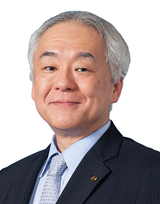Eisai is paying SEED Therapeutics an undisclosed amount upfront in a deal worth up to $1.5 billion to develop new ‘molecular glue’-based therapies for neurodegenerative diseases and cancer.
The Philadelphia-area biotech also announced Tuesday an initial close of a Series A-3 round of $24 million, which it said was led by Eisai. The partnership includes “multiple undisclosed neurodegeneration and oncology targets,” according to a press release.
SEED is a subsidiary of oncology company BeyondSpring Pharmaceuticals, and is focused on researching and developing so-called molecular glues — drugs that link a disease-causing protein to the body’s natural protein recycling machinery.
By leading problematic proteins to their end, drug developers hope to target a range of diseases in cancer, immunology and neurodegeneration.
 Takashi Owa
Takashi Owa“While the anti-myeloma drug lenalidomide from the molecular-glue class has been successful in the oncology field, our research collaboration will also focus on utilizing this modality in the neurology field,” Eisai’s top science executive Takashi Owa said in a statement. Owa was referring to a Bristol Myers Squibb drug marketed as Revlimid, whose mechanism of action has inspired molecular glue drug development.
The deal adds to SEED’s pharma partnerships. In 2020, Eli Lilly struck a research deal with SEED for $10 million upfront and a $10 million investment. That deal included $780 million in potential milestones, and SEED said on its website that it reached a third milestone in March.
Both Eisai and Lilly are developers of the first-approved Alzheimer’s drugs, with Eisai collaborating with Biogen on Leqembi and Lilly in July winning approval for its drug Kisunla.
Eisai’s Japanese rival Takeda in May signed its own molecular glue deal with Shanghai- and San Diego- based Degron Therapeutics for up to $1.2 billion. That deal spans undisclosed diseases across oncology, neuroscience and inflammation.
SEED said that it is targeting a second close for its Series A-3 round in the fourth quarter. It plans to use the funding to advance its internal pipeline, which includes a protein degrader for cancer and a tau degrader program in Alzheimer’s.